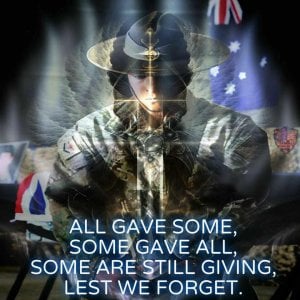LEST WE FORGET
Remembrance Day tradition
Why is this day special to Australians?
At 11 am on 11 November 1918 the guns of the Western Front fell silent after more than four years continuous warfare.
The allied armies had driven the German invaders back, having inflicted heavy defeats upon them over the preceding four months.
In November the Germans called for an armistice (suspension of fighting) in order to secure a peace settlement. They accepted allied terms that amounted to unconditional surrender.
The 11th hour of the 11th day of the 11th month attained a special significance in the post-war years.
The moment when hostilities ceased on the Western Front became universally associated with the remembrance of those who had died in the war.
This first modern world conflict had brought about the mobilisation of over 70 million people and left between 9 and 13 million dead, perhaps as many as one-third of them with no known grave.
The allied nations chose this day and time for the commemoration of their war dead.
On the first anniversary of the armistice in 1919 two minutes' silence was instituted as part of the main commemorative ceremony at the new Cenotaph in London.
The silence was proposed by Australian journalist Edward Honey, who was working in Fleet Street.
At about the same time, a South African statesman made a similar proposal to the British Cabinet, which endorsed it.
King George V personally requested all the people of the British Empire to suspend normal activities for two minutes on the hour of the armistice "which stayed the worldwide carnage of the four preceding years and marked the victory of Right and Freedom". The two minutes' silence was popularly adopted and it became a central feature of commemorations on Armistice Day.
On the second anniversary of the armistice in 1920 the commemoration was given added significance when it became a funeral, with the return of the remains of an unknown soldier from the battlefields of the Western Front.
Unknown soldiers were interred with full military honours in Westminster Abbey in London and at the Arc de Triumph in Paris. The entombment in London attracted over one million people within a week to pay their respects at the unknown soldier's tomb. Most other allied nations adopted the tradition of entombing unknown soldiers over the following decade.
After the end of the Second World War, the Australian and British governments changed the name to Remembrance Day.
Armistice Day was no longer an appropriate title for a day which would commemorate all war dead.
In Australia on the 75th anniversary of the armistice in 1993 Remembrance Day ceremonies again became the focus of national attention.
The remains of an unknown Australian soldier, exhumed from a First World War military cemetery in France, were ceremonially entombed in the Memorial's Hall of Memory.
Remembrance Day ceremonies were conducted simultaneously in towns and cities all over the country, culminating at the moment of burial at 11 am and coinciding with the traditional two minutes' silence.
This ceremony, which touched a chord across the Australian nation, re-established Remembrance Day as a significant day of commemoration.
Four years later, in 1997, Governor-General Sir William Deane issued a proclamation formally declaring 11 November to be Remembrance Day, urging all Australians to observe one minute's silence at 11 am on 11 November each year to remember those who died or suffered for Australia's cause in all wars and armed conflicts.
Remembrance Day tradition
Why is this day special to Australians?
At 11 am on 11 November 1918 the guns of the Western Front fell silent after more than four years continuous warfare.
The allied armies had driven the German invaders back, having inflicted heavy defeats upon them over the preceding four months.
In November the Germans called for an armistice (suspension of fighting) in order to secure a peace settlement. They accepted allied terms that amounted to unconditional surrender.
The 11th hour of the 11th day of the 11th month attained a special significance in the post-war years.
The moment when hostilities ceased on the Western Front became universally associated with the remembrance of those who had died in the war.
This first modern world conflict had brought about the mobilisation of over 70 million people and left between 9 and 13 million dead, perhaps as many as one-third of them with no known grave.
The allied nations chose this day and time for the commemoration of their war dead.
On the first anniversary of the armistice in 1919 two minutes' silence was instituted as part of the main commemorative ceremony at the new Cenotaph in London.
The silence was proposed by Australian journalist Edward Honey, who was working in Fleet Street.
At about the same time, a South African statesman made a similar proposal to the British Cabinet, which endorsed it.
King George V personally requested all the people of the British Empire to suspend normal activities for two minutes on the hour of the armistice "which stayed the worldwide carnage of the four preceding years and marked the victory of Right and Freedom". The two minutes' silence was popularly adopted and it became a central feature of commemorations on Armistice Day.
On the second anniversary of the armistice in 1920 the commemoration was given added significance when it became a funeral, with the return of the remains of an unknown soldier from the battlefields of the Western Front.
Unknown soldiers were interred with full military honours in Westminster Abbey in London and at the Arc de Triumph in Paris. The entombment in London attracted over one million people within a week to pay their respects at the unknown soldier's tomb. Most other allied nations adopted the tradition of entombing unknown soldiers over the following decade.
After the end of the Second World War, the Australian and British governments changed the name to Remembrance Day.
Armistice Day was no longer an appropriate title for a day which would commemorate all war dead.
In Australia on the 75th anniversary of the armistice in 1993 Remembrance Day ceremonies again became the focus of national attention.
The remains of an unknown Australian soldier, exhumed from a First World War military cemetery in France, were ceremonially entombed in the Memorial's Hall of Memory.
Remembrance Day ceremonies were conducted simultaneously in towns and cities all over the country, culminating at the moment of burial at 11 am and coinciding with the traditional two minutes' silence.
This ceremony, which touched a chord across the Australian nation, re-established Remembrance Day as a significant day of commemoration.
Four years later, in 1997, Governor-General Sir William Deane issued a proclamation formally declaring 11 November to be Remembrance Day, urging all Australians to observe one minute's silence at 11 am on 11 November each year to remember those who died or suffered for Australia's cause in all wars and armed conflicts.







